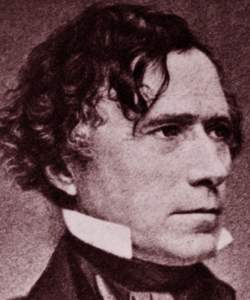Franklin Pierce (American National Biography)
Scholarship
Personal and public tragedy plagued Pierce's presidency and undoubtedly contributed to his serious drinking problem. He was president at a time that called for almost superhuman skills, yet he lacked such skills and never grew into the job to which he had been elected. His view of the Constitution and the Union was from the Jacksonian past. He never fully understood the nature or depth of Free Soil sentiment in the North. He was able to negotiate a reciprocal trade treaty with Canada, to begin the opening of Japan to western trade, to add land to the Southwest, and to sign legislation for the creation of an overseas empire. His Cuba and Kansas policies led only to deeper sectional strife. His support for the Kansas-Nebraska Act and his determination to enforce the Fugitive Slave Act helped polarize the sections. Pierce was hard-working and his administration largely untainted by graft, yet the legacy from those four turbulent years contributed to the tragedy of secession and civil war.
Larry Gara, "Pierce, Franklin," American National Biography Online, February 2000, http://www.anb.org/articles/04/04-00788.html.
Franklin Pierce (Congressional Biographical Directory)
Reference
PIERCE, Franklin, a Representative and a Senator from New Hampshire and 14th President of the United States; born in Hillsborough, N.H., November 23, 1804; attended the academies of Hancock and Francestown, N.H.; prepared for college at Exeter and graduated from Bowdoin College, Brunswick, Maine, in 1824; studied law; admitted to the bar and commenced practice in Hillsborough in 1827; member, State general court 1829-1833, and served as speaker 1832-1833; elected as a Democrat to the Twenty-third and Twenty-fourth Congresses (March 4, 1833-March 3, 1837); elected as a Democrat to the United States Senate and served from March 4, 1837, to February 28, 1842, when he resigned; chairman, Committee on Pensions (Twenty-sixth Congress); resumed the practice of law in Concord; district attorney for New Hampshire; declined the appointment as Attorney General of the United States tendered by President James Polk; served in the Mexican War as a colonel and brigadier general; member of the New Hampshire State constitutional convention in 1850 and served as its president; elected President of the United States on the Democratic ticket and served from March 4, 1853, to March 3, 1857; resumed the practice of law; died in Concord, N.H., October 8, 1869; interment in Minat Inclosure, Old North Cemetery.
“Pierce, Franklin,” Biographical Directory of the United States Congress, 1774 to Present, http://bioguide.congress.gov/scripts/biodisplay.pl?index=P000333.




